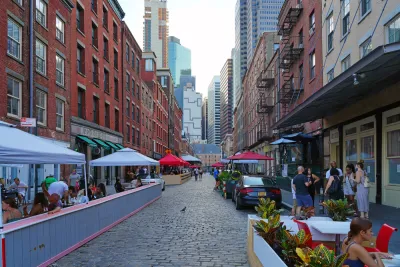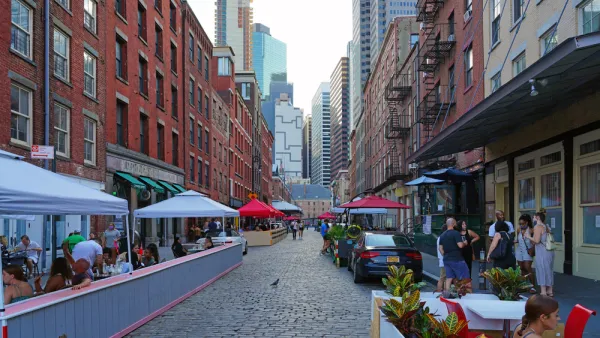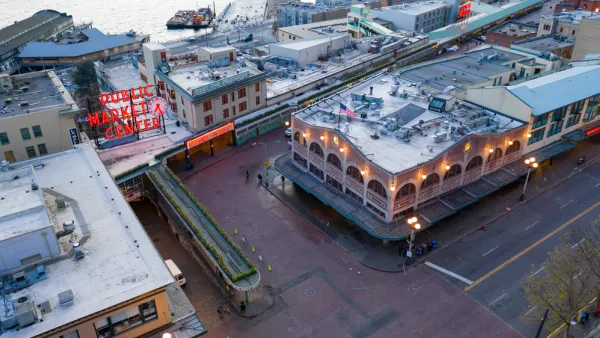New York City will now be measurably less car-centric for the indefinite future.

New York City Mayor Bill de Blasio announced late last week that the city of New York's Open Restaurants on Open Streets program, enacted as a lifeline for restaurants struggling to make ends meet during the COVID-19 pandemic, will be expanded and continued permanently.
Mayor de Blasio announced the city's new approach to restaurant regulations during an interview on Brian Lehrer's WNYC show, but the local urbanism news industry was quick to amplify the announcement.
Luke Fortney and Erika Adams report for Eater New York, explaining the details of the program as it will work in the future.
Under the new rules, restaurants will be allowed to keep sidewalk and curbside dining going indefinitely. The city’s Open Streets program, which designated dozens of city blocks to shut down to car traffic for dining in the street over the summer, will also be made a permanent fixture. "This will really help us as an important part of how we recover as a city," de Blasio said.
Restaurants will also be able to expand their frontage space to include seating in front of adjacent businesses if those landlords and tenants are open to it, the mayor said. He also stipulated that for restaurants that conduct outdoor dining in the winter, the space has to be kept “more open” to allow enough airflow. If the area is fully enclosed to better heat the space, those dining areas have to adhere to the same seating restrictions as indoor dining, which will start at 25 percent capacity next week.
According to Fortney and Adams, the permanent extension of the outdoor dining program comes as a result of protracted lobbying by restaurant owners. Despite the scheduled return of indoor dining in the city on September 30, many restaurant industry insiders consider outdoor dining essential for the survival of restaurant businesses through the winter.
The Open Streets component of this big reveal sparked the interest of Gersh Kuntzman at Streetsblog NYC, calling the mayor's announcement a long-overdue shift in priorities to people over cars. "It may turn out to be the single biggest conversion of public space since, well, since car drivers commandeered the curbside lane for free overnight vehicle storage in the 1950s," writes Kuntzman.
Kuntzman also notes that some of the program, as announced, can be achieved by executive action and other components will require legislative action by the City Council. Kuntzman also collects notable political reactions to the news, including that of advocates for mobile vending, who raise alarms about the city's track record of pushing out mobile street vendors to make room for the new outdoor dining arrangements.
FULL STORY: Outdoor Dining Is Now a Permanent NYC Fixture, Mayor Announces

National Parks Layoffs Will Cause Communities to Lose Billions
Thousands of essential park workers were laid off this week, just before the busy spring break season.

Retro-silient?: America’s First “Eco-burb,” The Woodlands Turns 50
A master-planned community north of Houston offers lessons on green infrastructure and resilient design, but falls short of its founder’s lofty affordability and walkability goals.

Delivering for America Plan Will Downgrade Mail Service in at Least 49.5 Percent of Zip Codes
Republican and Democrat lawmakers criticize the plan for its disproportionate negative impact on rural communities.

Test News Post 1
This is a summary

Test News Headline 46
Test for the image on the front page.

Balancing Bombs and Butterflies: How the National Guard Protects a Rare Species
The National Guard at Fort Indiantown Gap uses GIS technology and land management strategies to balance military training with conservation efforts, ensuring the survival of the rare eastern regal fritillary butterfly.
Urban Design for Planners 1: Software Tools
This six-course series explores essential urban design concepts using open source software and equips planners with the tools they need to participate fully in the urban design process.
Planning for Universal Design
Learn the tools for implementing Universal Design in planning regulations.
EMC Planning Group, Inc.
Planetizen
Planetizen
Mpact (formerly Rail~Volution)
Great Falls Development Authority, Inc.
HUDs Office of Policy Development and Research
NYU Wagner Graduate School of Public Service




























